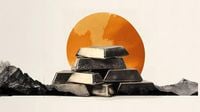The United Arab Emirates (UAE) has firmly established itself as a vital player in the global gold market, a fact underscored by its impressive gold import statistics and market dynamics. With over a third of its imports comprising gold reserves, the UAE has become a significant hub for gold transactions, primarily catering to markets in India, Switzerland, and the USA. In 2019, the nation saw its gold imports soar to an astounding $20 billion, reflecting a notable increase from the previous year.
Consumer purchases of jewelry are the primary driving force behind the UAE's gold demand, accounting for nearly half of all transactions. Institutional investors and banks also play a crucial role, acquiring substantial amounts of gold during times of economic uncertainty or when profit potential appears favorable. Despite local production, the UAE heavily relies on global markets to meet its gold supply needs, supplemented by imports from Africa and Europe.
As of May 9, 2025, gold prices in the UAE saw an uptick, with the price per gram standing at 391.84 United Arab Emirates Dirhams (AED), up from AED 390.34 the previous day. Similarly, the price for one tola of gold increased to AED 4,570.33 from AED 4,552.89. The price for gold is updated daily based on market rates, which are influenced by a variety of factors, including geopolitical events and economic policies.
Gold has long been regarded as a safe-haven asset, especially during turbulent times. Its role as a store of value and medium of exchange has only grown, with central banks increasingly diversifying their reserves by adding gold to bolster economic strength and currency stability. In 2022, central banks added a record 1,136 tonnes of gold to their reserves, valued at around $70 billion, marking the highest yearly purchase since records began. This trend is particularly pronounced among emerging economies such as China, India, and Turkey, which are rapidly increasing their gold holdings.
The relationship between gold prices and the US Dollar is significant, as gold is priced in dollars. A weaker dollar generally leads to higher gold prices, while a stronger dollar tends to keep prices in check. Current geopolitical tensions, such as the ongoing conflict between Russia and Ukraine, and escalating military concerns in the Middle East, continue to bolster gold's appeal as a safe-haven asset.
On the political front, recent developments have impacted market sentiment. On May 8, 2025, US President Donald Trump and British Prime Minister Keir Starmer announced a limited bilateral trade deal, maintaining a 10% tariff on goods imported from the UK. Additionally, the Trump administration is reportedly considering lowering tariffs on China from 145% to 50% in the near future, which could further influence market dynamics.
The Federal Reserve's stance on interest rates also plays a pivotal role in shaping gold prices. Indications from the Fed suggest that it is not inclined to cut interest rates anytime soon, which has allowed the US Dollar to strengthen against its recent lows. This situation has contributed to an environment where investors are cautious about gold, as higher interest rates typically weigh down on non-yielding assets like gold.
Geopolitical risks remain a significant concern, with reports of attacks from both Russia and Ukraine on the first day of a three-day unilateral ceasefire called by Russian President Vladimir Putin. Furthermore, tensions between Israel and Iran-backed Houthis in Yemen, alongside fears of a broader military conflict along the India-Pakistan border, keep market participants on high alert. Such uncertainties often lead investors back to gold as a reliable asset.
As the UAE navigates these complex geopolitical and economic landscapes, its gold market is expected to face various challenges and opportunities. The transition from physical gold to digital investments could present hurdles for traditional trading practices, as consumers and investors increasingly seek more innovative ways to engage with the gold market.
Despite these potential challenges, the UAE's robust infrastructure, supportive governmental policies, and active participation in international initiatives signal a promising outlook for its gold industry. The nation's ability to adapt to changing market conditions will be crucial in maintaining its status as a leading gold trading hub.
Looking ahead, fluctuations in oil prices and global economic growth concerns could impact demand for gold products. However, the enduring appeal of gold as a hedge against inflation and currency depreciation ensures that it will continue to hold a significant place in the investment portfolios of both individual and institutional investors.
In summary, the UAE's gold market is not just a reflection of local demand but a barometer of global economic health. As geopolitical tensions and economic policies evolve, the dynamics of the gold market will undoubtedly shift, making it essential for investors to stay informed and agile in their strategies.




